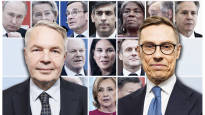As former foreign ministers, Stubb and Haavisto certainly know the Russian foreign minister Sergei Lavrov. The veteran diplomat has been in charge of the Russian Foreign Ministry since May 2004, so he has had time to go through many foreign ministers of other countries.
Both Stubb’s and Haavisto’s foreign minister terms coincided with times of crisis in relations with Russia. Stubb was foreign minister and chairman of the Organization for Security and Cooperation in Europe (OSCE) when Russia and Georgia fought a brief war in August 2008 over the breakaway region of South Ossetia. Of course, Haavisto’s last season was affected by Russia’s major attack on Ukraine in February 2022.
There is no great joy in knowing Lavrov in the current state of relations. Stubb said that he sent Lavrov text messages after the attack started, asking him to influence to Vladimir Putin. Lavrov was most obviously not sympathetic to the idea.
As for the war, the Russian foreign minister does not seem to be at the center of decision-making.
Lavrov is rather the implementer of the Kremlin’s line than its creator. It remains for him to rudely repeat Russia’s message and promote good relations with the countries of the so-called global south, which prefer to follow the ongoing conflict in Europe from the sidelines.
Haavisto has also previously been in contact with Russian environmental activists and civil society. All kinds of civic activism are largely suppressed in Russia under the conditions of war, and contacts abroad are under dark suspicion.
In Russia’s leadership, of course, Stubb’s relations with the United States and his early support for NATO are not counted as a plus. In that sense, Haavistoka, who as foreign minister was piloting Finland into NATO, is not popular either.
In Russia’s current rhetoric, Finland is now seen as a vassal of the United States, no matter which one of them becomes president.
